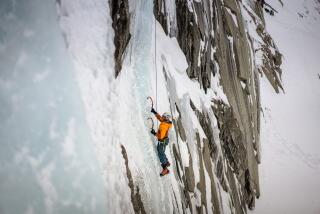Durable Champion
- Share via
Had he been a sprinter or a football player, Fritz Wiessner most likely would have been an Olympic champion or a high-salaried American hero. But he engaged in the obscure and curious pastimes of rock climbing and mountaineering, so Wiessner was mostly unknown to Americans at his death last weekend in Stowe, Vt., at the age of 88. Among those familiar with the mountains and climbing, however, Wiessner held olympian respect and awe.
The Dresden native came to the United States in 1929 after establishing a reputation as one of Europe’s most accomplished climbers. Joining with rope mates from his adopted country, Wiessner pioneered daunting climbs both in North America and in Asia. He led the first ascent of Devil’s Tower in Wyoming and of Canada’s Mt. Waddington, then considered the most difficult climb on this continent, and only after 14 previous attempts by others had failed.
In 1939 Wiessner and Pasang Lama climbed to within 750 feet of the 28,250-foot summit of K2 in the Karakoram Himalayas, now part of Pakistan, without oxygen or the lightweight gear available to contemporary mountaineers. Wiessner almost certainly would have finished the ascent of the world’s second-highest mountain, more than 15 years before it finally was climbed, except that Pasang refused to continue even though the weather was fair and the greatest difficulties had been overcome. Wiessner declined to leave Pasang alone, so they turned back.
Wiessner, the leader of the expedition, became the center of a nasty controversy when one American and three Sherpas died in a stormbound camp high on K2 in the week after Wiessner’s aborted summit attempt. His critics accused him of being so consumed with climbing the mountain himself that he neglected the welfare of others. So bitter was he at the unwarranted attacks, partly fueled by anti-German sentiment, that he resigned from the American Alpine Club. He was returned to the club in 1966 with an honorary lifetime membership. Wiessner continued to do difficult rock climbs well into his 80s.
Just as Wiessner passes from the scene, climbing is emerging from the wilderness--amid considerable controversy within the climbing community--as a competitive spectator sport and possibly as an Olympic demonstration event. The potential Olympic climbers have pushed standards to remarkable degrees of difficulty, but none can surpass the pioneering achievements of Fritz Wiessner, champion of the lonely heights.
More to Read
Go beyond the scoreboard
Get the latest on L.A.'s teams in the daily Sports Report newsletter.
You may occasionally receive promotional content from the Los Angeles Times.





